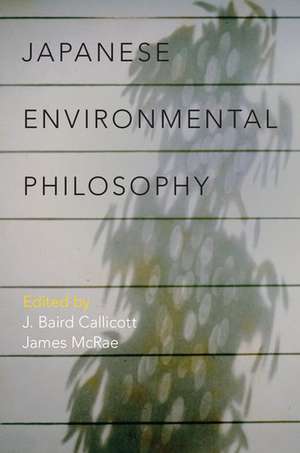Japanese Environmental Philosophy
Editat de J. Baird Callicott, James McRaeen Limba Engleză Paperback – 15 iun 2017
| Toate formatele și edițiile | Preț | Express |
|---|---|---|
| Paperback (1) | 346.25 lei 32-37 zile | |
| Oxford University Press – 15 iun 2017 | 346.25 lei 32-37 zile | |
| Hardback (1) | 703.90 lei 32-37 zile | |
| Oxford University Press – 12 oct 2017 | 703.90 lei 32-37 zile |
Preț: 346.25 lei
Preț vechi: 442.67 lei
-22% Nou
Puncte Express: 519
Preț estimativ în valută:
66.25€ • 72.19$ • 55.83£
66.25€ • 72.19$ • 55.83£
Carte tipărită la comandă
Livrare economică 14-19 aprilie
Preluare comenzi: 021 569.72.76
Specificații
ISBN-13: 9780190456337
ISBN-10: 0190456337
Pagini: 336
Dimensiuni: 155 x 231 x 23 mm
Greutate: 0.48 kg
Editura: Oxford University Press
Colecția OUP USA
Locul publicării:New York, United States
ISBN-10: 0190456337
Pagini: 336
Dimensiuni: 155 x 231 x 23 mm
Greutate: 0.48 kg
Editura: Oxford University Press
Colecția OUP USA
Locul publicării:New York, United States
Recenzii
Japanese Environmental Philosophy provides timely perspectives on the ecological exigencies facing our world while also offering essential scholarship in the burgeoning field of Japanese philosophy... [for] it offers fresh perspectives on key debates. The quality of the work in this anthology is excellent. ... Working through the volume the reader will engage with foundational aspects of Japanese cultural, religious, and philosophical traditions, with an eye toward contemporary environmental concerns. Given the mounting ecological crises we are experiencing throughout the world, environmental philosophy should not be confined to a specialized subfield. ... Japanese Environmental Philosophy is a model of how an anthology can open up a space for productive cross-cultural environmental theory and action.
It is, to my knowledge, one of the most (if not the most) comprehensive collections dealing with environmental philosophy in Japan ... it is abundant in ideas, hints, and clues that can help us develop a new frame of mind to help us deal with contemporary environmental problems. Secondly, it is structured upon the premise that "philosophy" should not be understood in a narrow sense (e.g., the Graeco-European tradition), but broadly as the practice of thinking about the world ... it is clear from their inclusion of thinkers as diverse as Dogen and Kukai, Watsuji and Imanishi that their stance on philosophy is very open and inclusive.
It is, to my knowledge, one of the most (if not the most) comprehensive collections dealing with environmental philosophy in Japan ... it is abundant in ideas, hints, and clues that can help us develop a new frame of mind to help us deal with contemporary environmental problems. Secondly, it is structured upon the premise that "philosophy" should not be understood in a narrow sense (e.g., the Graeco-European tradition), but broadly as the practice of thinking about the world ... it is clear from their inclusion of thinkers as diverse as Dogen and Kukai, Watsuji and Imanishi that their stance on philosophy is very open and inclusive.
Notă biografică
J. Baird Callicott is the co-Editor-in-Chief of the Encyclopedia of Environmental Ethics and Philosophy and author or editor of a score of books and author of dozens of journal articles, encyclopedia entries, and book chapters in environmental philosophy and ethics. Callicott has served the International Society for Environmental Ethics as President, Yale University as Bioethicist-in-Residence, and the National Socio-environmental Synthesis Center as Visiting Senior Research Scientist (funded by the National Science Foundation). His most recent book is Thinking Like a Planet: The Land Ethic and the Earth Ethic (Oxford University Press, 2013).James McRae serves as Vice-Chair of the Faculty and Associate Professor of Asian Philosophy and Religion at Westminster College in Fulton, Missouri. His publications include the books Environmental Philosophy in Asian Traditions of Thought (with J. Baird Callicott, SUNY Press, 2014) and The Philosophy of Ang Lee (with Robert Arp and Adam Barkman, University Press of Kentucky, 2013).
